#for whom does the bell toll?? THEE!!!!!!!!!
Explore tagged Tumblr posts
Text
L just died in death note &. what the fuck was that whole episode. hello.
#that whole foot washing scene is like. a deliberate metaphor right. like it really comes across that way. the. wording? the weird tenderness#etc etc. jesus christ.#for whom does the bell toll?? THEE!!!!!!!!!#jesus christ
1 note
·
View note
Text

#weird al#damn he kinda does look like david tennant when hes in his Normal Al guise#anyway i respect this poster for openly preaching the ''weird al is hot'' gospel#i only do it on tumblr so it doesnt count#ask not for whom the weird al thirst bell tolls; it tolls for thee#youtube comments#testimonials#stories
35 notes
·
View notes
Text
🧠🪱Wiggly Wednesday🪱🧠
Thanks for tagging me, @wheneverfeasible!
This is not fully formed at all, I was just listening to For Whom The Bell Tolls earlier and thought “Tolls for Thee” would be a cool fic title and also a good opportunity for a road toll pun.
Cw for… major character death, I guess? It’s Eddie. 😔 It might be temporary.
So Eddie gets attacked by the bats at the end of season four. He's proud of himself when he tells Dustin he didn’t run. And yeah, he’s bleeding and crying and dying and doesn’t even get a chance to close his eyes before slipping, but he knows he did the right thing and that makes it *his year.*
Next thing he knows, he’s in the passenger seat of Wayne’s truck. He recognizes the road; this is the drive they took from where Wayne picked him up after Al’s arrest, heading back to Hawkins. At the time, twelve years old and full of restless frustration at having so little say in his own life (wanted a bike and Al got him one, but then pawned it; wanted to stay in his current school with the couple of friends he’d managed to make since the last move but child welfare had other ideas; wanted a guitar but like hell anyone was ever going to trust his clumsy ass with one; and so on), Eddie had spent the entire ride staring straight ahead at the End Of The Line, Dead End, Hawkins, Indiana.
The truck pulls up to a toll station, and a familiar voice asks, “Got any change?”
Except, that’s not Wayne.
Eddie startles and whips his head around to stare at Steve Harrington, looking like he had when driving the hot-wired RV. Still wearing the battle vest and torn shirt bandages, chest distractingly bare.
“Hey,” Steve says, good-naturedly snapping his fingers in front of Eddie’s face. “My eyes are up here, man. You got any change or not?” When Eddie shakes his head, Steve just shrugs. “Me neither. Well, fuck it!”
He floors it, tires shrieking as they speed past the booth without paying. And, fuck it, Eddie whoops and laughs along with him. What had he been so tense and sad about a minute ago?
Oh. Right.
“Am I dead?” Eddie asks, rolling his window up so there’s less wind to drown out the answer. On the other side of the truck cab, Steve does the same.
“Eh,” Steve responds, wavering his hand in the air between them in a *kinda sorta* gesture. “It could go either way right now, but.” He nods forward, at the road. “We’re getting there.”
A pit opens in Eddie’s stomach. “We?”
“Well, you.” Steve flashes him an apologetic smile, the kind Eddie had seen in school whenever the guy had called Tommy to heel after something that crossed the line. “I’m just along for the ride. To keep you company, you know? Everyone has to do this alone, but there’s like… this instinct, you know? To have some sort of connection along the way. So, here I am.”
He’s a figment of Eddie’s imagination, then. It figures. Eddie has never had any actual one on one time with Steve except in the bad-dark-wrong version of the woods around Hawkins, displaced into a hostile alternate dimension and crawling with Vecna vines. Which maybe explains the choice in outfit, and the smudges of dirt and blood on the guy.
“Sorry,” Eddie mutters anyway. Even though it’s not really Steve, and he can’t really apologize for the way he’s left Dustin holding his dying body. It does make him feel a little better, is the thing—which is the whole point. Closure. “You told me not to be a hero, and I guess I kind of fucked that up.”
“You sure did,” Steve says, sounding both amused and exasperated at the same time.
“Still,” Eddie adds thoughtfully, “at least the company’s not too bad.”
That’s all I’ve got. Maybe they hold hands for a bit. Maybe they get to the end of the line and before Eddie gets out of the truck he kisses Steve—which turns into Steve giving him the kiss of life back in the land of the living and Eddie is in the back of some vehicle that’s just pulling up to the ER.
Who knows? Not me. Someone else write the rest, I’m tired.
So tired I’m just gonna do my permanent tag list and call it a night. If you’re not so much with the writing, tell me a wiggly worm of something you’d like to read, idk. (Don’t say more of this, that’s cheating. 😭)
@hotluncheddie @lawrencebshoggoth @sofadofax @irishvampireboy @oatmilk-vampire
@hamiltonswiftie @grtwdsmwhr @yesdangerpls @theseaofdespair
22 notes
·
View notes
Text
MePhone X voice: "For whom does the bell toll"? GIRL!! It tolls for THEE !!!!!
#ii 16#ii 16 spoilers#inanimate insanity#inanimate insanity spoilers#I GUESS I DONT KNOW has everyone seen the episode yet????
20 notes
·
View notes
Note
Sorry I got the Episode wrong.
It's episode 4 that starts out with the quote "for whom the bell tolls: It tolls for thee" and later on we see the Zombie on the bell trying to drag Ben down in a pit of walkers and the last two episodes as a whole are filled with church bells ringing
It feels like the writers were going for smth here, yknow
Ah, got it! So the first thing to say is that it wouldn't technically be "church" bells, since the bell tower was part of a school I think. But as symbolism I definitely think there's a connection between Chuck's quote at the beginning and the bells.
Bells ringing, particularly church bells, are something that happens when someone in the community has died. "Ask not for whom the bell tolls, it tolls for thee" is basically a way of saying that everyone will die eventually. The issue of death and human mortality is a big theme throughout The Walking Dead, but in terms of this specific episode there's a lot we can point out.
For one, there's Chuck's unavoidable death in this episode, Fitting, since he's the one who said the quote. There's also Ben who can optionally die at his own request. For Kenny, it's very easy to read that he probably WANTS to die after losing his family, and so to him his own death no doubt feels very inevitable. Then there's Vernon and the cancer survivors, who in their own way have seemed to "defy" death by overcoming cancer. Unfortunately for Brie, death catches up to her as she meets her end in Crawford, proving once more than no one escapes in the end. There's also Molly's sister, and Clementine grappling with the idea that her parents have died, not to mention Omid being on the brink of death due to his leg infection. And of course, you can't talk about episode four without mentioning Lee's bite at the end, resulting in his own inevitable death.
Speaking of Crawford, I think they are perhaps the best example of the episode's theme of the inevitability of death. They did so many horrible things, weeding out the sick and the weak, the old and the young, all so that they could prolong their own lives. They even allowed a dictator to have total control with the promise that he'd keep them alive. And yet, in the end, they're all long dead by the time Lee and company arrive. Undone by their own draconian policies. Crawford more than anything else in the episode showcases the inevitability of death. That no matter what you do, you can't escape it in the end. In fact, trying to avoid it can often make it arrive all the quicker.
Overall, while Christianity does deal heavily with themes of death and mortality, particularly in the Resurrection and Crucifixion of Jesus Christ, and God's promise of eternal life to those that believe in Him, I wouldn't necessarily consider the themes of episode four to be specifically Christian, even if "for whom the bell tolls" references a Christian tradition. Pretty much every culture and religion has had to grapple with death in one way or another. It's one of the few unchanging constants in the human experience: everyone dies eventually. It's pretty much as universal as themes get. And like so many cultures and religions, TWDG has about the same conclusion: that this life, whether or not you think there's another kind of life that comes afterward, will inevitably come to an end. You can embrace it like Ben did. You can try to fight like Crawford or Molly or the cancer survivors. You can deny it like Clementine. Or you can simply await it like Kenny did. Death comes all the same.
Thanks for the ask! Don't get many of them these days, so it feels very nice to be able to provide a nice, long answer like this! Hope you like my response!
#ask#the walking dead game#twdg#twdg chuck#twdg ben paul#twdg kenny#twdg vernon#twdg brie#twdg molly#twdg clementine#twdg omid#twdg lee everett
11 notes
·
View notes
Text

For whom does the bell toll
THEE
#I’m finally getting the classic tumblr ads#thank you tumblr gods#I’m so tired of seeing the badly animated naked vampire twink s
7 notes
·
View notes
Note
I'm sleeby too so my prompt is also: sleepy
Sleepy heihua maybe? Or whoever you feel like writing! Are they grumpy? Are they cute? Are they morning people? Who is bringing the caffeine, what were they up to late at night...(I'm rambling soz)
(what i find SUPER fun about this choice is that i actually think i write heihua resting too much, and i suspect it's partially me using rest-as-kindness for characters who are nearly always defined by what they do. I accidentally fell into writing a headcanon I've always held, which is Xiao Hua is an inhuman monster who is energised after sex, because it was that or just outline their imagined coffee orders. Which, you know. Secretly vanilla latte but gets snobby about it, cheapest item for caffeine yield on the menu, guess who is who.)
There had been a moment, you know? Horrible in its depth and clarity, all Truth Climbing Out of Her Well To Shame Mankind; minor key eulogy in concerto; ask not for whom the bell tolls, it tolls for thee -
And it had been the one where Hei Xiazi had realised how truly, madly, deeply fucked over he was going to be by this man, and it had been shortly after they first time they had fucked, so the verb form truly is doing dual-lifting this time. Every night since Xie Yuchen had intruded onto his life, and then every morning, and incidental, alternate, opportune times, a similar pattern has emerged. Today was not an exception.
With all the scathing curiosity of a scientist, Xie Yuchen sits up in bed, reaches over Hei Xiazi's prone body for his phone, and says, sounding entirely, searingly awake, "Why is it that you're always falling asleep after?"
Hei Xiazi half-opens his eyes in outrage at the implied criticism. Xie Yuchen briefly looks at him, clear-eyed and unrepentant, the smug little shit. If it wasn't for the darkening bruises on his chest and the kissed-stupid colour of his mouth, he might look as alert as he does walking into a morning meeting. It's obscene. It's unnatural. Hei Xiazi feels like he's being killed on a hill entirely worth dying on, because -
"I'm tired," Hei Xiazi says, and the incensed nature of the statement isn't carrying over too well with most of his face pressed against a pillow, but he refuses to move and concede ground. He's earned this. "I put in work, and then I get tired. That's human biology."
"Hm," Xie Yuchen says, with the mild disbelief of the superior. "I didn't realise we were an ongoing scientific demonstration. Am I grading you for effort, or on a curve?"
He returns to opening up one of the many stupid little mobile games on his phone he refuses to admit he's always playing. Hei Xiazi has seen his player score on at least three different ones, and nobody is getting to that number without some serious, single-minded waste of their one wild and precious life. In his opinion.
"It's normal," Hei Xiazi feels compelled to state, "To be tired right now."
"You've said."
"I'm saying again."
"I've heard you say it again now," Xie Yuchen replies, "If you're tired, aren't you meant to be asleep?"
His hand, very briefly, reaches down and sinks into Hei Xiazi's hair, combing out the tangled mess of it -
Until he's fully absorbed back into the complexities of fucking Tetris or whatever and needs the hand back to, Hei Xiazi doesn't even know, turn the leaderboard into an unholy massacre.
Hei Xiazi sighs, and tells himself he wins if he does nothing else but close his eyes again.
20 notes
·
View notes
Note
To whom the bell tolls it tolls for thee.
Does that mean i get to die soon? Sweet!!!!!!!!!!
2 notes
·
View notes
Text
BNHA 375 Japanese to English Translation w/ Commentary Part II
Picking up where we left off in Part I (https://at.tumblr.com/antiquity1111/bnha-375-japanese-to-english-translation-w/vwhhc282ew05), Jin (仁) means “benevolence (especially as a virtue of Confucianism); consideration; compassion; humanity; humankind; charity; altruism; human; person.”
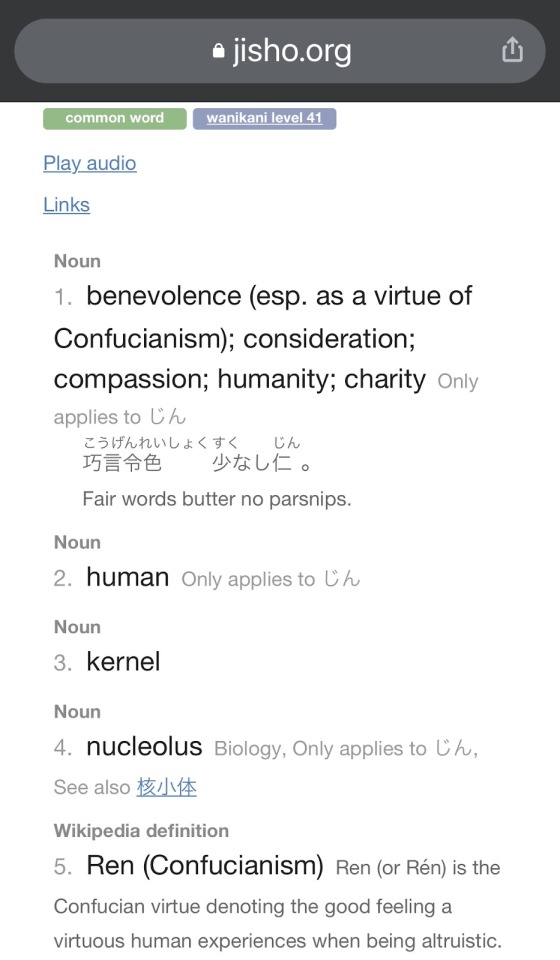
I was curious about the “kernel” definition because the first image that comes to my mind when I hear that word is a popcorn or sunflower kernel and I wasn’t initially sure how that relates to humanity, people, benevolence, compassion, etc. A kernel is the “softer, usually edible part of a nut, seed, or fruit stone contained within its hard shell.” It is also defined as “the central or most important part of something,” the core or heart. The kernel of a sentient being like a human or other animal is its soul.
Taking all of these potential definitions together, Jin (仁) can be understood to refer to and, in the context of the BNHA character, embody the brother- and sisterhood of humankind and humanity’s heart and soul. He represented the Everyman.
Jin (仁) is related to the concept of Ren in Confucianism (Chinese for “humaneness; benevolence; compassion; kindness; person of virtue”) and was broadly defined by Confucius as follows:
The person exhibiting this quality is one who “wishing to be established himself, seeks also to establish others; wishing to be enlarged himself, he seeks also to enlarge others.”
Gang Xu described Ren as empathy, defined as feeling and understanding another’s pain as intimately as if it were one’s own due to shared experience. Ren also encompasses compassion, defined as action taken to alleviate the suffering of another.
Gang Xu explained, “So, a man of Ren helps others become established if he desires to establish himself, and helps others reach their goals if he desires to reach his. Being able to make analogies between his own situations and those of others around him could be called the approach to Ren."
You might have heard the saying “do unto others as you would have others do unto you” or “treat others like you would like to be treated.” This is a simplified version of Ren adults often recite to children to encourage them to be kinder to one another. The crux of Ren can be summarized by the phrase, borrowed from Full Metal Alchemist: Brotherhood (highly recommend anime and manga!), “all is one, and one is all, and all is me.” The FMAB animanga does an awesome job of conveying the meaning of this phrase and interconnectedness of all living things across all time, space, and dimensions. This hyperlink will take you to a short YouTube video of the moment in the anime when Ed and Al begin understanding the essence of Ren:
youtube
My mother is a lover of literature and taught middle school English for many years. One of her favorite literary quotes of all time, credited to John Donne, is also one of mine and exemplifies Ren:
No man is an island, entire of itself. Every man is a piece of the continent, a part of the main. If a clod be washed away by the sea, Europe is the less, as well as if a promontory were, as well as if a manor of thine own or thine friend’s were. Any man’s death diminishes me, because I am involved in mankind. Therefore, never send to know for whom the bell tolls. It tolls for thee.
John Donne wrote these lines during the last decade of his life when he was gravely ill and grappling with an acute awareness of his own mortality and the frailty and sanctity of life. The meaning is this: However independent we might pride ourselves on being, none of us can subsist alone. By design, we are all interconnected and interdependent on one another for our survival and emotional well-being. We all have an equal share in the world, and “all” of humanity is helped or harmed when “one” is.
We should feel a sense of belonging to the whole of the human race, and should feel a sense of loss at every death, because it has taken something away from [humankind]... The suffering and passing of another human being should affect us, not least because it is a regular reminder that one day, it will be us for whom the funeral bell is tolling. The funeral bell that tolls for another person’s death, then, also tolls for us, in a sense, because it marks the death of a part of us, but also because it is a memento mori, a reminder that we ourselves will die one day.
Jin understood this concept. He lived and died by and for it. I would argue that more than his fear and confusion regarding whether he was real or a clone, more than mental illness and personality disturbance, more than being “unlucky” by Hawks’ standards, Jin was characterized by sincerity, compassion, selflessness, and a willingness—indeed, an innate feeling of *obligation*—to do unto others as he would have others do unto him. His sympathy and concern for humanity was so absolute, it extended even to the clones he created of himself and others.
If Jin’s purpose in the story was to be a personification of humanity, then symbolically, Hawks killed “humanity”; Touya, whose own name means “ignited arrow” or “arrow of light,” i.e., the one to bring to light the hypocrisy, violence, and corruption long hidden in the shadows of Hero society, saved a small part of “humanity,” unbeknownst to Hawks, and gifted it to Himiko, who mourned for “humanity”; and Himiko, whose surname, Toga, contains a kanji (渡, romaji: to, meaning “to ferry across (e.g., a river); to carry across; to traverse”) that may be an allusion to the migration Buddhists believe souls must make across the Sanzu River after death and cremation (Dabi) before they can be reborn into one of six realms of existence, was the one to “carry” and “give birth” to “humanity,” performing a miracle by bridging life and death, creating something (a person) from nothing (blood), restoring “humanity” to (second) life.
どの道このままじゃ何もできないで終わる
= Well, in any case, as it is, this will end with me not being able to do anything.
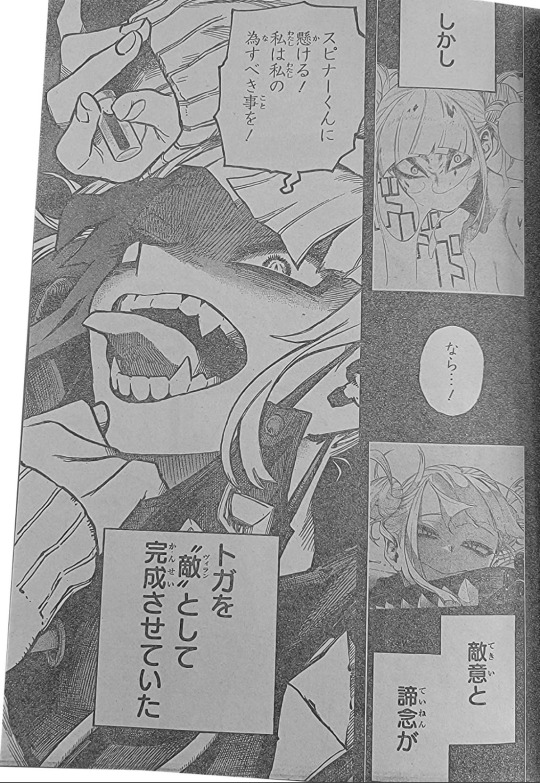
しかし
= However,
The text in the untagged (not tied to any character) square boxes are narration. Everything else is Himiko’s internal dialogue. She does more thinking than speaking in this chapter.
なら…!
= If that’s how it is…!
敵意と
= hostility
諦念が
= and resignation
スピナーくんに懸ける!私は私の為すべき事を!
= I’ll bet it all on Spinner-kun! [I’ll bet] what I should try to do [on him]!
Among other definitions not relevant to the context, 為す (romaji: nasu) means “to do; to perform; to intend to; to attempt; to try.” べき (romaji: beki) means “should; must; ought to.”
Because Himiko is wagering her escape or capture on an uncertainty (Spinner successfully reclaiming Kurogiri for the Villains and coming to her rescue with Warp Gate), I translated nasu as “try to do.” She is hoping her efforts to resist the Heroes’ offensive will not be for nothing, but she cannot be sure that she won’t have used Jin’s blood only for them both to be defeated.
トガを"敵"として完成させていた トガを"ヴィラン"としてかんせいさせていた
= completed her transformation into a “Villain” (read as: “enemy”).
See the quotation marks around “Villain / enemy”? Maybe they mean something, maybe they don’t, but every time I see a word written inside quotation marks like that, I pause and ask myself, “Why is this word being written as if it were someone else’s phrasing, as if the word would be read aloud by a person making air quotes with their fingers, as if the degree to which the word in quotation marks matches the person or thing being described is meant to be questioned?”
What does it mean to be a “Villain”? What does it mean to be a “Hero”? Do these words have any real validity when Heroes also kill and Villains also protect? When the “line” differentiating Heroes from Villains and Villains from Heroes is so fine as to be almost imperceptible except in the most extreme of cases (literally, AFO), who decides who to label a “Hero” and who to label a “Villain”? Who benefits from dividing people into rigid, blanket categories of “good, righteous” and “bad, monstrous”? Where, when, and why did these terms originate? Can any society that promotes social division truly be just?
Himiko has become a full-fledged “Villain / enemy,” but by whose rubric? In whose eyes is she a “Villain / enemy”? She was certainly not a “Villain / enemy” to Jin. He looked at her and saw only a kind, sympathetic, endearing girl who ought to be nurtured and shielded from harm. And to Tomura, Touya, Spinner, and Atsuhiro, she is a dear friend and comrade, not a “Villain / enemy.” It is Heroes and civilians who view Himiko as a “Villain / enemy,” an adversary to be dealt with, a problem to be solved. This should not surprise anyone. Himiko is, after all, a “Villain / enemy” by definition. So why is that word in quotation marks? I suspect the answer can be found in Tomura’s monologue from No.281. You can read my full Japanese to English translation for it here: English vs. Japanese Translation Comparison for Tomura’s 281 Speech: https://at.tumblr.com/antiquity1111/bnha-english-vs-japanese-translation-comparison/z5l7sqh0lqql.

来た!
= There it is!
来た (romaji: kita) is the ta-form (or past tense) of the verb 来る (romaji: kuru), meaning “to come (spatially or temporally); to approach; to arrive,” and refers to Himiko having finally brought out a vial of blood to consume for Transform, as Tsuyu had been expecting her to do. This line sounds more natural in English translated like this, as Viz’s translator, Caleb Cook, rendered it, than it would translated literally as “[It] came!”
血のストック!
= Her stock of blood!
AFO⁉︎ 死柄木⁉︎ 誰の血だろうと
= AFO!? Shigaraki!? [No matter] whose blood it is,
それをさせない為の‼︎
= I won’t let you do that!!
梅雨ちゃんは冷静…
= “Tsuyu-chan is levelheaded…”
冷静 (romaji: reisei) is an adjective meaning “calm; composed; cool (of emotion); serene; presence of mind.” Composure is defined as “the state or feeling of being calm and in control of oneself.” Presence of mind is defined as “the ability to remain calm and take quick, sensible action.” Levelheaded is defined as “calm and sensible.” These words all more or less mean the same thing. Himiko is describing Tsuyu as a person who is generally not swayed by nervousness, anger, or other strong emotions. This characteristic detachment allows Tsuyu to make sound judgments even under duress. She’s not the most energetic, enthusiastic, or expressive person, but she’s grounded, reliable, and performs well in high-stakes situations.
そこね
= There.
This isn’t particularly important to the overall chapter, but let’s talk about this word for a moment anyway. Depending on how we read it, the meaning changes. If we read it as one word, そこね (romaji: sokone), then Himiko is reflecting on Tsuyu’s failure to do something that she needed to have done successfully: destroy Twice’s blood. Assuming that was Horikoshi’s intention, then I would translate そこね as “Too bad,” as in “Good job, Tsuyu-chan, you destroyed my vial. Too bad it was a fake and you played right into my hands!” If we read そこね as two words (romaji: soko ne), then the meaning would be “There,” as in “There, I got her,” with ne acting as a filler word. This is the translation I went with because I lean toward this being the meaning Horikoshi intended. The difference between these potential translations is in whether Himiko is focused on Tsuyu (“Too bad [for you]”) or her mission (“There”), with the chapter’s emphasis on Himiko strategizing for the first time and her own thought process throughout the chapter clarifying that she has moved beyond any interest she might have had in Izuku, Ochako, or Tsuyu and is now squarely committed to actualizing her goal of eradicating Hero society and eliminating the Heroes that uphold it.
だからそれはフェイク
= “That’s why that’s a fake.”
AFOさんがくれた"脳無を引きつけるお薬"です
= “It’s a ‘chemical that attracts Noumu’ that AFO-san gave me.”
Slow down and reread Himiko’s last few (spoken) lines. She said, “Tsuyu-chan is levelheaded… That’s why that’s a fake.” In other words, Himiko, AFO, or both anticipated that Tsuyu (and Ochako, I’m sure) would try to isolate her for attack and used the information she had acquired about Tsuyu’s personality, blind spots / weaknesses, and fighting style from past encounters to develop a countermeasure against her. (They probably also brainstormed a special plan of action for dealing with Ochako, but we’ll have to wait to find out!)
Did you notice the quotation marks around “脳無を引きつけるお薬”? Those aren’t Himiko’s words. The context makes clear that she is quoting AFO when she says “chemical that attracts Noumu.” That is how AFO described it to Himiko and how she is describing it to Tsuyu.
薬 (romaji: kusuri) is a noun meaning “medicine; pharmaceutical; drug (legal or illegal).” Pikahlua translated 薬 as “medicine” and Caleb as “chemical.” Technically, both are right. Kusuri can refer to a chemical, especially a toxic chemical, used for its effect on living organisms. Examples include insecticide, herbicide, and chemical warfare. For me, a medicine is something used to treat a physical ailment of some kind, like a bacterial infection or a burn, and a drug is a substance that produces a physiological effect when ingested or otherwise introduced into the body, like marijuana, hallucinogens, opiates, or alcohol. I think of healing when I think of medicine, so in my mind, “drug” is the better of the two translations (medicine vs. drug). However, it was Tsuyu breaking the vial containing the mysterious liquid, exposing it to the air, that caused it to take effect, drawing the Noumu in, which is precisely how chemical attractants work. AFO gave Himiko a chemical attractant for Noumu and Tsuyu accidentally coated herself in it. I think “chemical” is the best choice of translation for kusuri, so that is the word I used.
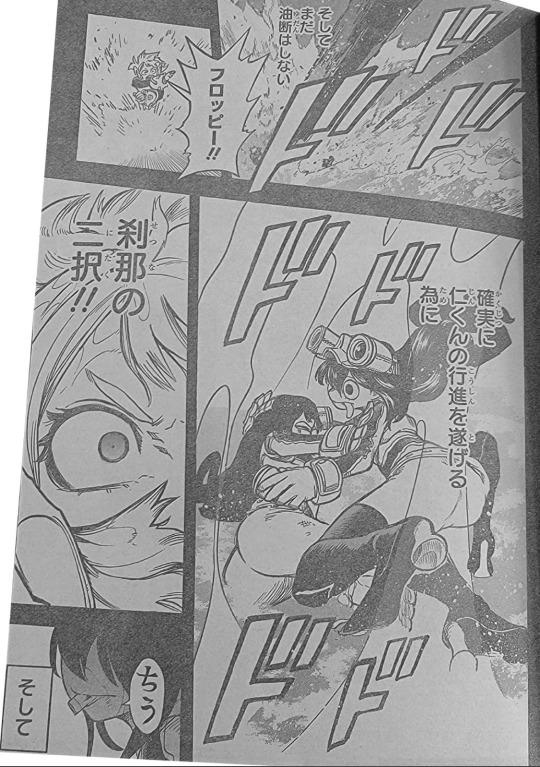
そしてまだ油断はしない
= I can’t let my guard down yet.
フロッピー‼︎
= “Froppy!!”
確実に仁くんの行進を遂げる為に
= In order to carry out Jin-kun’s march without fail,
遂げる (romaji: togeru) is a verb meaning “to accomplish; to achieve; to carry out; to arrive at (a certain outcome); to come to; to end with.” If you also read Pikahlua’s translation posts, then you’ll know that they translated this word as “achieve,” and they weren’t wrong to do so. I translated it as “carry out” because Touya and Himiko had discussed using Jin’s blood to keep the Miserable Parade marching for Jin (and for themselves) in No.341, with Touya specifically saying, “Let’s [let] the Miserable Parade continue [in Twice’s honor]. The ones to laugh at the end of it will be us.” This isn’t something they’ll be doing for themselves (or for each other) alone. This is something they’ll simultaneously be doing for Jin, whose march came to a sudden, violent end when he was murdered. Touya worded his sentence as if he and Himiko will be doing Jin a favor by continuing the Miserable Parade in his stead, so they will, in effect, be carrying something out (the Miserable Parade) on someone else’s behalf (Jin’s).
刹那の二択‼︎
= for the moment [there are] two options!!
二 (romaji: ni) means “two.” 択 (romaji: taku) is a counter for choices, options, etc. I’m not sure why Caleb translated this line as “I have to make an instant decision!!” His translation, coupled with the placement of the text over half of Ochako’s stunned face, implies that it is Ochako thinking that she must quickly pick out who is the real Tsuyu and who is the imposter (how cliche), but I’m fairly certain that this is the second half to the previous sentence fragment (‘in order to carry out Jin-kun’s march without fail…’). Given that Himiko has already caught Tsuyu in a well-timed trap using the fake blood (actually chemical attractant for Noumu) and is attempting to create another diversion (her capricious, over-the-top Izuku-related antics at the start of the war were also a distraction intended to buy time for her comrades) to stall for more time for Spinner to retrieve Kurogiri and warp her off the island to another location, it only makes sense for this line to be a continuation of the prior one. This chapter is heavily centered on Himiko and highlights her development from a whimsical girl with a traumatic past and criminal history to a mature “Villain” who is clever, astute, and powerful enough to more or less single-handedly decimate Japanese civilization.
ちう
As Pikahlua noted in their translation post for No.375, “This is a verbalized sound effect Tsuyu makes when she sticks her tongue out.”
そして
= And then…
This is the Narrator (Horikoshi).
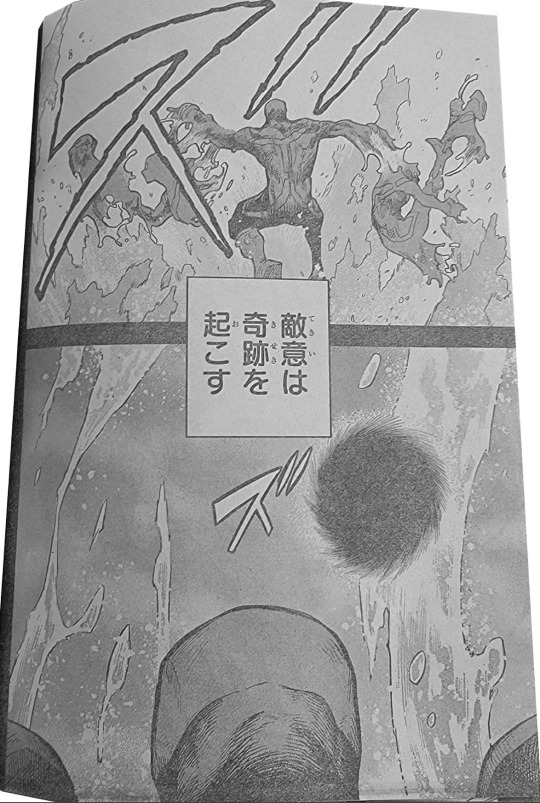
敵意は奇跡を起こす
= her hostility brought about a miracle.
That’s Himiko, Transformed into Twice and making clones who are themselves making clones, all of whom are wearing Twice’s black bodysuit. If you look carefully at the two already partially formed clones, you’ll notice they both have the beginnings of the gray horizontal and vertical line designs of his costume.
For reference, this is Twice’s uniform:
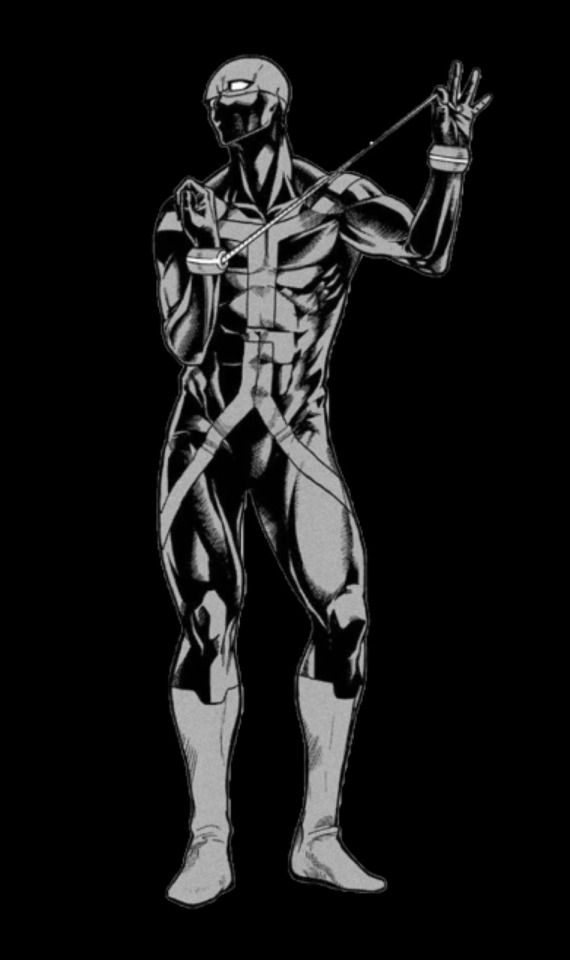
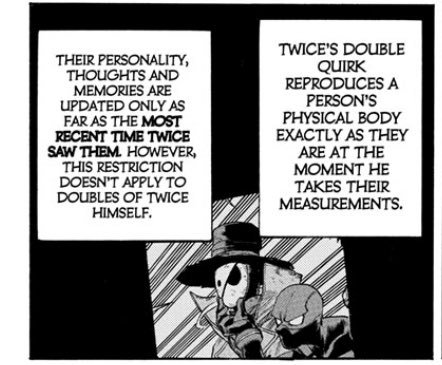
The clones Himiko creates don’t seem to be the least bit confused about where they are or startled to be alive (Double produces a genetic copy of a person as they were when the user last saw them; because Himiko last saw Jin when he was dying, an authentic clone of Jin should retain his memories of being betrayed and killed by Hawks and should be disoriented, even distressed; after all, he was distraught when he died, and how can he be alive if he remembers dying?).
The clones Himiko creates need no direction from her to know to begin multiplying. The only plausible explanation I can think of is that these are clones of Himiko herself Transformed into Twice so that she can access Double while still being able to use Transform. To be able to create a clone of Twice himself, Himiko would first need to take her measurements while Transformed, as a person using Double can only create a clone of a person whose exact measurements they know, which is why Twice’s Quirk involved the use of measuring tape. It is, of course, possible that Himiko’s original Transformation into Twice was “off-screened” and that she took her (his) measurements while Transformed in preparation for the war, which would allow her to create clones with his personality and memories without delay. If she also created a clone of Twice at that time, then she could bypass needing to explain the situation to Jin to catch him up on everything that has transpired since his passing as well as the emotional shock for both of seeing him reanimated. Unfortunately, that would mean that their reunion happened off-screen and if we are shown it at all, it will be in a flashback. The logic in doing this would be for her instantaneous Transformation into Twice to surprise us and to ensure that the focus remains on Himiko, rather than Jin, a dead character, overshadowing her, a living character. Jin is continuing to influence the story in death through other characters, particularly Himiko, but he is dead and cannot be allowed to outshine characters whose narrative arcs are still ongoing.
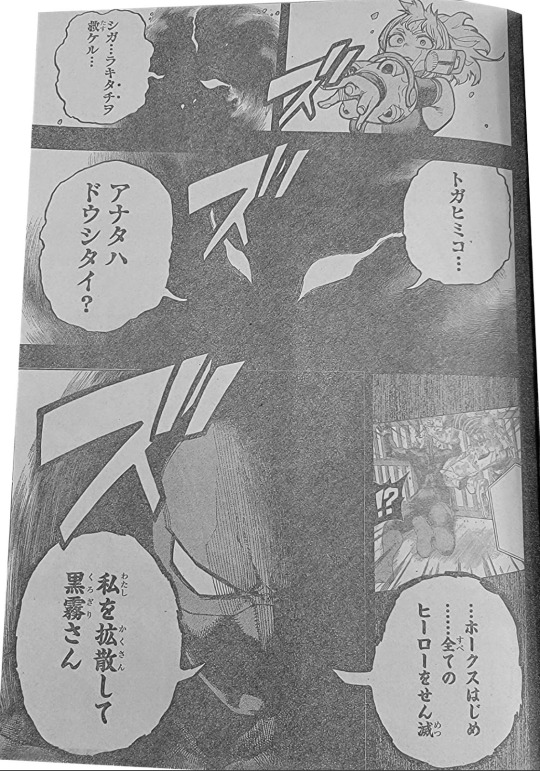
シガ…ラキタチヲ救ケル…
= “[I will] save Shiga… raki and his comrades…”
Do you see the little black dots to the right of タチ? They’re called bouten, or “side marks.” They are written in the furigana space above horizontal text or to the right of vertical text to express emphasis, similar to italicized or bold text. タチ is also written in katakana, further emphasizing it.
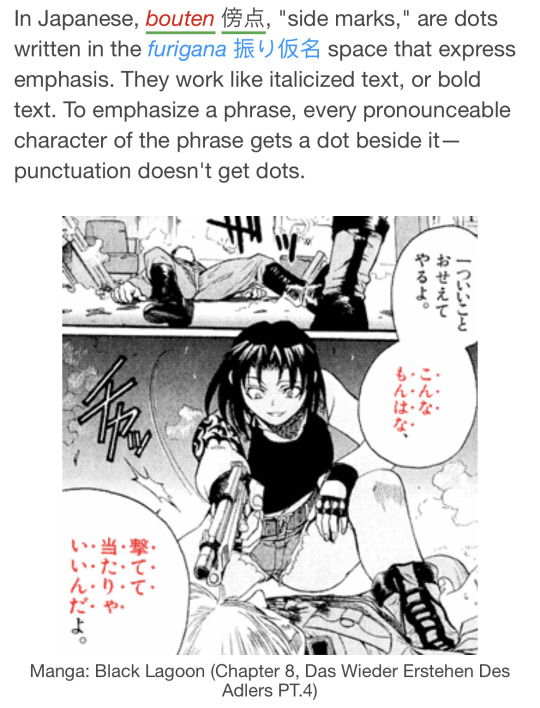
The word being emphasized is タチ (romaji: tachi), more commonly written たち or 達, a suffix that is used almost exclusively for people and attaches to a noun or pronoun to make a quasi-plural representing a group of people to which that noun or pronoun belongs. Let’s look at some examples so we can better understand how it works. 俺 (romaji: ore) is a first person pronoun meaning “I; me; my; myself.” 俺 (romaji: ore) + たち (romaji: tachi) = 俺たち (romaji: oretachi), meaning “we; us; our; ourselves.” 子供 (romaji: kodomo) is a noun that means “child.” 子供 (romaji: kodomo) + 達 (romaji: tachi) = 子供達 (romaji: kodomotachi), meaning “children.”
In Kurogiri’s sentence, -tachi attaches to Shigaraki. When -tachi combines with a noun like a person’s name, it can be loosely translated as “and company�� and refers to that person in addition to the group of people of which they are a part. It is often translated as “and the others,” but that does not necessarily capture the nuance of togetherness implied by -tachi. Who are “the others”? What is the relationship between “the others” and the noun or pronoun? Everyone who votes in an election is a registered voter, but they are not all affiliated with the same political party or voting for the same political candidates. Similarly, Tomura is a Villain, but he does not associate with or represent all Villains. Accordingly, Kurogiri is not interested in helping every Villain. He is only striving to help Shigaraki-tachi, or the group of people of which Shigaraki is a part. The common translation (“the others”) sounds better, but the latter clarifies that when Kurogiri says “the others,” he only means the other members of Tomura Shigaraki’s League of Villains: Spinner, Dabi, Toga, and Mr. Compress. (Kurogiri had been in captivity for several months at the point that Jin was killed, so he should not know about that and might still be including him as someone he must save, unless we are to assume Spinner informed him of Jin’s death).
Viz’s translator, Caleb Cook, opted for “Shigaraki and his allies,” which isn’t a bad translation per se but does have the effect of creating distance between Shigaraki and the others that does not exist in Japanese. This is something he periodically does that downplays the strong emotional bond between the members of the League of Villains and makes it seem as if they are more like coworkers or business partners who begrudgingly tolerate one another than they are close friends or family when that couldn’t be further from the truth.
Like Jin, Tomura uses the word 仲間 (romaji: nakama) for the League of Villains. That is a neutral word for a “companion; fellow; friend; comrade; partner; colleague; coworker; associate; teammate.” Typically, it describes people who are working together toward something and collaborating for mutual success. Nakama connotes a sense of camaraderie and community and can also refer to a close, family-like relationship between people not related by blood or marriage. This is the word that Luffy from One Piece uses for his crewmates.
Let’s further define some of those definitions, shall we? Beginning with “ally,” because that is the word Caleb used, Merriam Webster defines an ally as “one that is associated with another as a helper; a person or group that provides assistance and support in an ongoing effort, activity, or struggle.” The Cambridge Dictionary defines an ally as “someone who helps and supports someone else.” Dictionary.com defines an ally as “a person, group, or nation that is associated with another or others for some common cause or purpose; a person who supports or cooperates with another; a supporter.” Maybe it’s just me, or maybe it’s because this is the word countries use to describe their tentative alliances with neighboring countries, but the relationship between allies strikes me as impersonal and fragile, liable to break at a moment’s notice when circumstances change and/or someone feels threatened.
Compare that to the definitions for companion and comrade. The Merriam Webster Dictionary defines a companion as “one that accompanies another; one that keeps company with another.” The Longman Dictionary of Contemporary English defines a companion as “someone you spend a lot of time with, especially a friend.” Wiktionary defines a companion as “a friend, acquaintance, or partner; someone with whom one spends time or accompanies.” Webster’s New World College Dictionary defines a comrade as “a person who shares interests and activities in common with others; partner; associate.” Comrade is defined by Merriam Webster as “an intimate friend or associate; a fellow soldier.” The Cambridge Dictionary defines a comrade as “a friend or trusted companion, especially one with whom you have been involved in difficult or dangerous, usually military, activities.” Related is the phrase “comrade in arms” or “brother in arms,” often heard in World War I and World War II movies and games in reference to soldiers who risk their lives to fight alongside and rescue one another from certain death. Dabi and Twice were described as being “brothers in arms” in Ultra Analysis: The Official Character Guide. Below is more on the meaning of that phrase and the deep bond it describes.
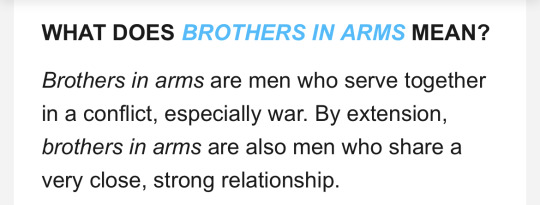
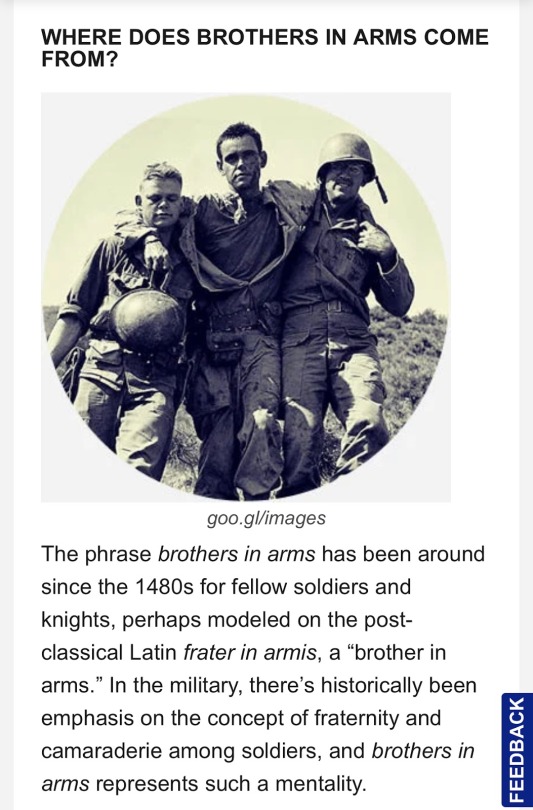
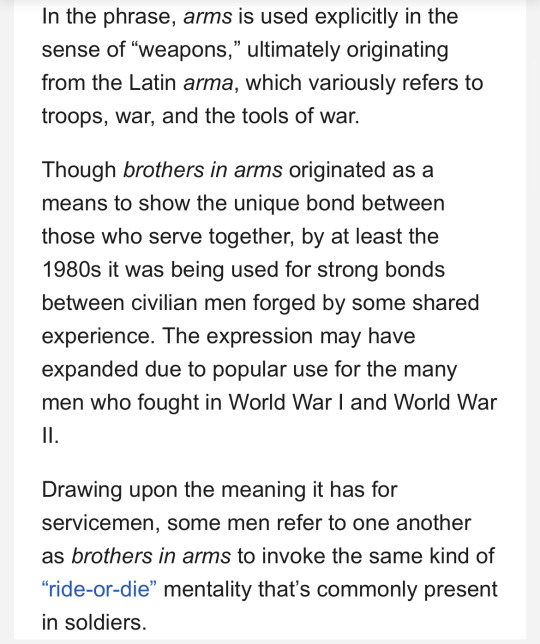
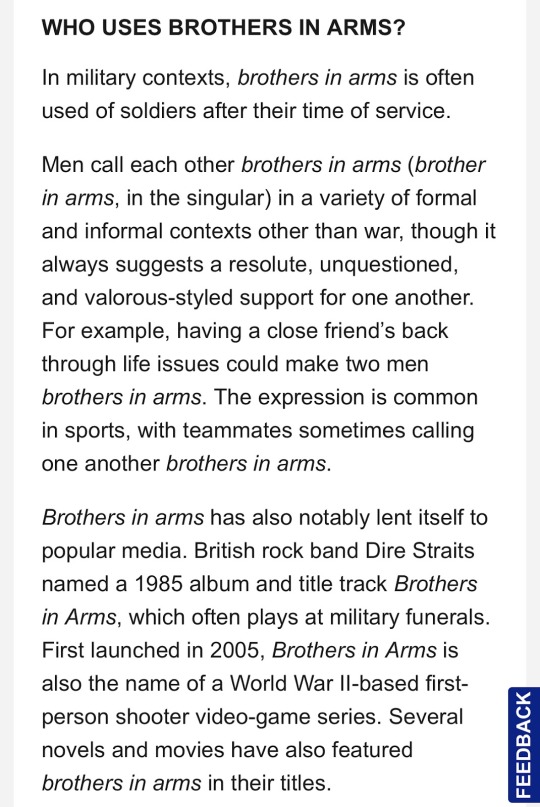
Hopefully, by now, you understand why I disagree with Caleb’s decision to keep reducing the League of Villains’ relationships to “associates” or “allies” when Tomura himself used a word for them that can also mean “companion,” “comrade,” or “friend,” words that suggest warm connections and sincere attachment that is more befitting of how the League of Villains actually behaves than the colder “associates” or “allies” implies. I mean, Atsuhiro had literally been captured by a Hero and was dangling from the sky by carbon fiber wires, choking for air, with the war seeming to be lost when he publicly declared, “I loved the League of Villains,” breaking cultural norms against such forward expressions of affection, and gouged his own side out to provide the others with a chance to escape, fully believing he would die in the process and committing to doing it anyway for their sake. How many people would be willing to lay down their life for someone they work with? Not a friend, definitely not family, but a coworker, just another rank and file employee, a faceless name Sharpied on a paper tag taking up one of the seats at Monday morning’s meeting? Very few. Personally, my preference is for “comrade” because it combines the friendliness and familiarity of a friend or companion with the shared mission of brothers (and sisters!) in arms.

トガヒミコ…
= “Himiko Toga…”
アナタハドウシタイ?
= “What do you want to do?”
…ホークスはじめ……全てのヒーローをせん滅
= “... Starting with Hawks…… [I want to] annihilate all Heroes.”
私を拡散して黒霧さん
= “Distribute / scatter me [around], Kurogiri-san.”
Himiko seems to be requesting that Kurogiri send clones of her (or Twice, or both) to as many sites as possible. Warp Gate relies on geographic coordinates to open portals at specific locations, so for Kurogiri to have found Himiko, Skeptic would have had to feed him that information. Recall that Skeptic is monitoring every battlefield from wherever he is hiding and using space satellites to track everyone. He was also shown to be smuggling something underground, presumably into the evacuation shelters at UA, where the civilians were gathered after the first war and remain, insufficiently protected, if they are being guarded at all, due to the shameful number of Heroes who retired and/or fled to other countries in the aftermath of the PLF War when public opinion of Heroes soured. Yes, Principal Nezu paid a whopping $7 million out of pocket for security upgrades to defend against exterior attacks, but did the Heroes also plan for a Villain Trojan horse, for an attack from within the walls of their formidable fortress? AFO’s affiliates are still awaiting orders from their position inside UA’s evacuation shelters with the frightened civilians. There are still two Near High-End Noumu who are unaccounted for. Could they be in the steel crate Skeptic is moving underground toward… something? It is certainly possible. If the Near High-End Noumu are unleashed on the unsuspecting civilians, they will be forced to break the law by using their Quirks to defend themselves without a permit or license. The majority of Japan’s population will, in effect, become criminals, i.e., “Villains.” What’s more, the world Destro, Redestro, and the Meta Liberation Army dreamed of will have been realized, with everyone with a Quirk freely using theirs. And perhaps, in the absolute pandemonium of that hellscape, the civilians, who were long ago stripped of their powers and made to rely on Heroes to protect them, will discover that they are perfectly capable of protecting themselves if they can only put aside their differences and prejudices to look after one another. And so they, too, will become “heroes.” Notice that lower case h! In Boku no Hero Academia, a capital h Hero is a person officially authorized by the Hero Public Safety Commission (HPSC) to use their Quirk to fight Villains. It is illegal to use your Quirk to fight Villains without a provisional or professional license. If the civilians break the law to use their Quirks to defend against an internal attack, they will not have become capital h “Heroes,” but they will have become lower case h “heroes.”

待てええまだ——!
= “Waaaiiit, not yet——!”
私まだあなたと恋バナしてない!
= “I still haven’t talked about [my] crush / love interest with you!”
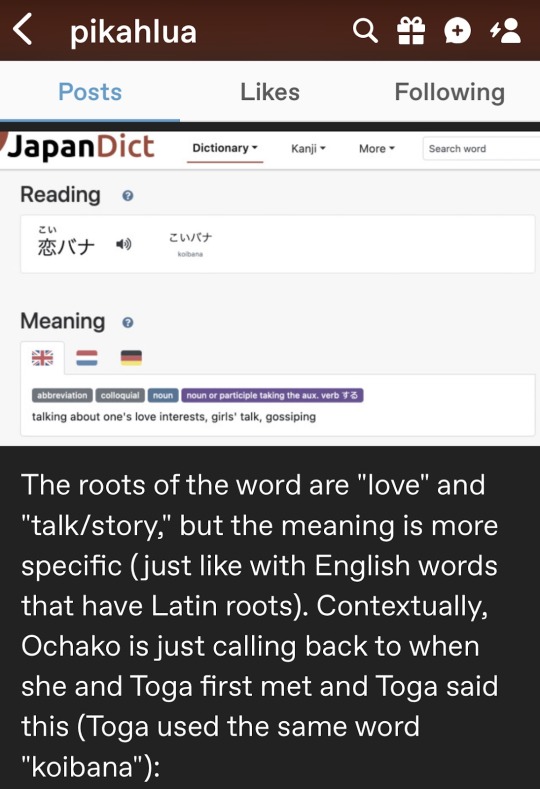
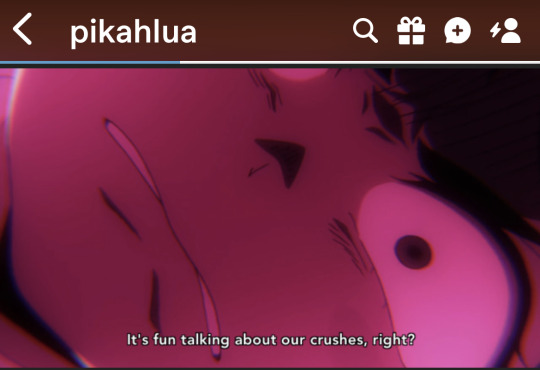
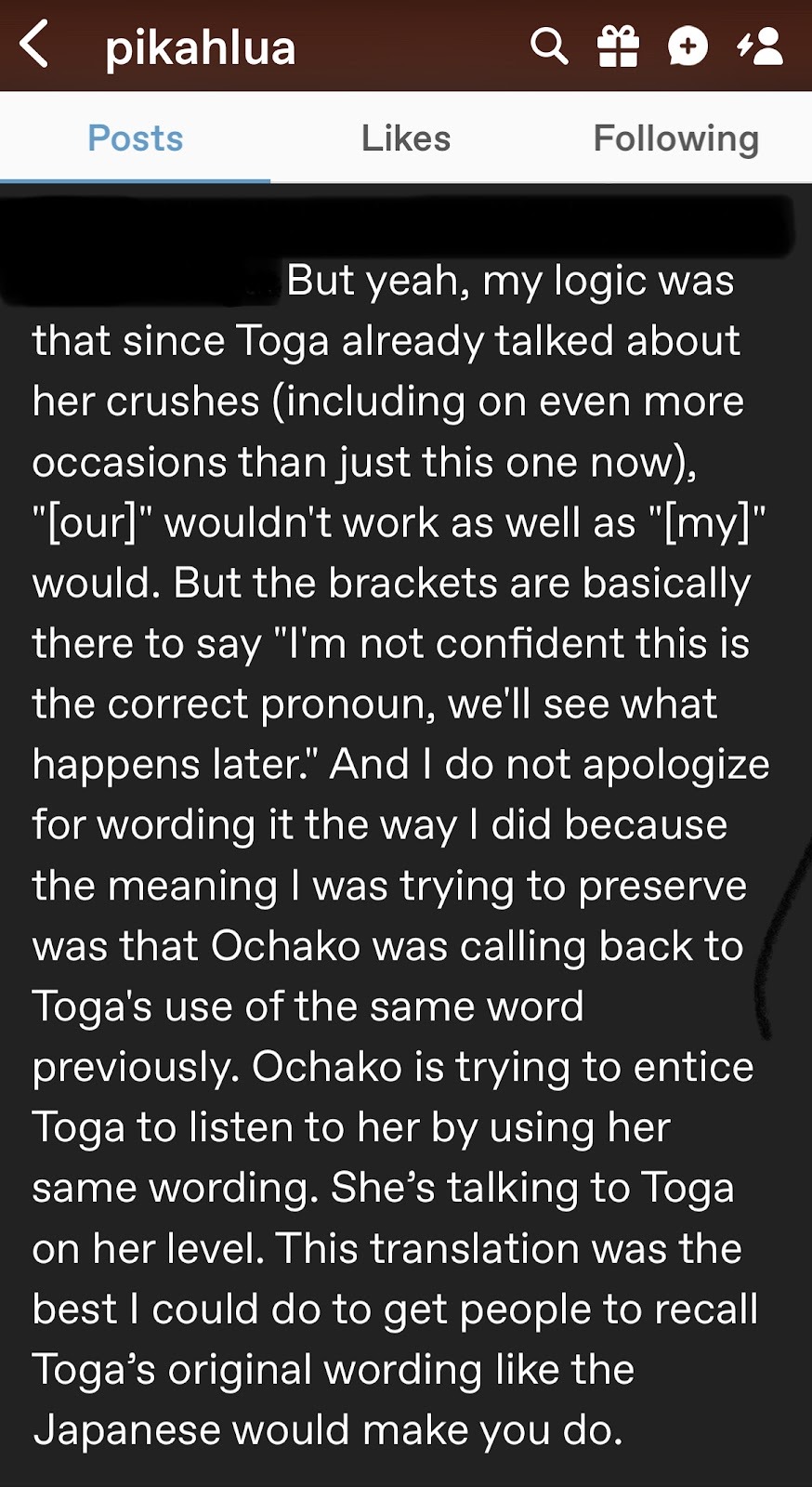
I’ve seen several fans active in the Twitter fandom interpreting Ochako’s call out to Himiko as a genuine plea for the two of them to talk and hopefully connect. I disagree and think that that is a misunderstanding of Ochako’s motivations. Like @lloftvlly on Twitter noted, Ochako has always been painfully honest with Himiko about not being interested in sharing “girl talk” or being her “friend.” She is a Hero and her priority is saving lives. The last thing she wants to do is talk about romance, least of all with her enemy, especially when people’s lives are at stake, but Himiko’s already Transformed, Doubling, and about to escape to another battlefield using Kurogiri’s Warp Gate. Ochako has lost control of the situation. She probably also overheard Himiko telling Kurogiri that she intends to kill every Hero, beginning with Hawks, who specifically entrusted Ochako with subduing Himiko by any means necessary. Ochako is desperate, and it is this desperation that prompted her to call out to Himiko in the hope that she could coerce her into staying, that she could contain the damage Himiko has promised to deal to the Hero side to Okutou Island. Ochako is a Hero and her priority is saving lives. That is why she called out to Himiko. It didn’t work because Himiko’s grief and anger over Jin’s murder outweighs any desire she once had of peacefully coexisting with Heroes like Izuku and Ochako.
お茶子ちゃん…‼︎
= Ochako-chan…!!
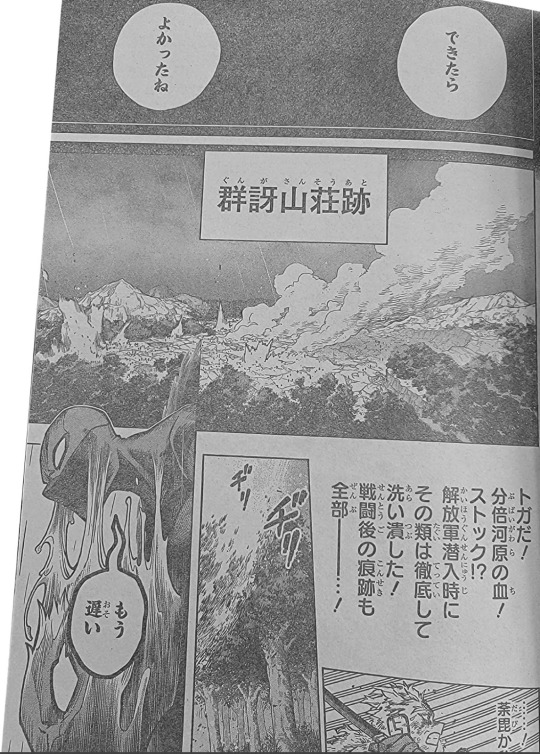
できたらよかったね
= “If we could have [done that] / had been able to [do that], that would have been nice.”
できたら (romaji: dekitara) is the ta-form (past tense) of the verb できる (romaji: dekiru), meaning “to be able (in a position) to do,” and よかった (romaji: yokatta) is the ta-form of the adjective よい (romaji: yoi), meaning “good; excellent; fine; nice; pleasant; agreeable.”
It is important to understand that Himiko’s use of the ta-form of these words indicates that this is something she would have liked to have happened in the past but has since moved on from.
群訝山荘跡
Gunga Mountain Villa Ruins
トガだ!分倍河原の血!ストック⁉︎解放軍潜入時にその類は徹底して洗い潰した!戦闘後の痕跡も全部ーーー…!
= That’s Toga! Bubaigawara’s blood! [She had that in her] stock!? When I infiltrated the Liberation Army, I thoroughly washed away anything like that! Even / also all traces from after the battle———...!
も (romaji: mo) is a common particle and adverb with a variety of meanings and uses. Here, も means “too; also; as well; even.” The inclusion of も matters because it means that Hawks scrubbed all evidence of Jin from the murder site IN ADDITION TO someplace else, presumably all of Gunga Mountain Villa or even Gunga Mountain itself. Hawks and his associates scoured *every inch* of the area to erase all remnants of Jin and ensure no part of him could be recovered and used by the Villains. Recall that during and in the days following the PLF War, Gunga Mountain was overrun with Heroes. They arrested more than 100,000 soldiers of the Meta Liberation Army. Jin’s body would have been bagged and tagged by the Heroes storming Gunga Mountain Villa, along with everything and everyone collected. On Hawks’ orders, Jin’s body would have been immediately incinerated to destroy all blood, skin, flesh, bone, bone marrow, anything that could be used to power an attack against the Heroes by a person with the right Quirk (or to prove that Hawks had stabbed Jin in the back as he was fleeing from him, meaning Hawks had been on offense, NOT defense, when he “pulled the trigger,” so to speak). Hawks’ priority when confronting Jin was to save lives, sure, but not Jin’s. From the moment Hawks infiltrated the Paranormal Liberation Front, he was prepared to kill to “neutralize the threat,” as is his method and the HPSC’s way.
When Hawks learned that Jin had overcome his fear of using Double to its full potential, he determined that he had become the Villains’ “greatest asset” and a more imminent threat than Shigaraki. He resolved to kill him if he could not make good use of him (by coercing him into abandoning his allies, the LoV and MLA, with empty promises of helping him to “start over,” no doubt on the condition that he would ally with the Heroes to take down Shigaraki and the others, like Gentle Criminal, La Brava, and Lady Nagant are doing now). Hawks thinks and operates like he is playing a chess game where Villains and Heroes are pieces on the board for him to move and sacrifice as needed to achieve his objectives, i.e., completing missions. He is nothing if not efficient and cutthroat. He even alludes to such here (No.255, pg.14):

There is plenty to be said about how Keigo was conditioned by the HPSC. Ultimately, however, he has spent more years of his life as “Hawks” (~17 years) than “Keigo” (~6 years). His identity formed around being a soldier and state-sponsored killer. It has become who he is. He carries out his orders without a hint of remorse. He (usually) does not hesitate to kill people because in his mind, he is not so much killing *people* as he is neutralizing *enemies*. He does not reflect on his extrajudicial murders because he is so certain of being in the right. He can also rest assured he will be supported by his fellow Heroes, and no, the “younger generation” are not “exceptions to the rule,” as evidenced by Tokoyami’s automatic justification of Hawks’ crime. Hawks is a masterful manipulator and social chameleon, a man of many “faces,” taking on the shape that best suits him at any given moment to satisfy his ends. He takes pride in his ability to mislead, hoodwink, and double-cross others. He knows he is a skilled liar and is eager to boast about it, which he literally did as Jin, a severely mentally ill man, lay sobbing before him, losing his mind over how he could have been so stupid as to trust Hawks and lead him right to the League of Villains.
Hawks would not have walked into his confrontation with Jin without a contingency plan in place to mitigate the risk of Toga acquiring Jin’s blood should he refuse to comply with Hawks’ demands and be killed. To argue otherwise would be to insult Hawks’ intelligence. The Heroes stationed at Gunga Mountain Villa to gather evidence for future prosecutions would also have been assigned responsibility for bagging and tagging Jin’s corpse and delivering it to a crematorium, unless they chose instead to destroy his body where it fell. In No.375, Hawks takes credit for meticulously “washing away” all that had remained of Jin after he killed him, implying that he was personally involved in both the disposal of the body (otherwise, how could he be certain Toga had not accessed it?) and the cleanup afterward. We know that Hawks was unconscious, on the brink of death, and being treated for serious burn injuries while the PLF War raged on. We know that Hawks voluntarily discharged against medical advice within a day of regaining consciousness and asked Best Jeanist to take him to visit both Tomie’s HPSC-funded house and Endeavor at Central Hospital. He was in a car with Best Jeanist and Endeavor tracking Deku’s movements for several weeks. Then he partnered with Tsukauchi, All Might, and other Pro Heroes to devise a strategy for the upcoming war. When would he have had time to take the bullet train across the country to the Gunga Mountain Villa Ruins? Are bullet trains even still running post-war? For reference, Shouji is at Central Hospital and Endeavor and AFO are at the Gunga Mountain Villa Ruins.
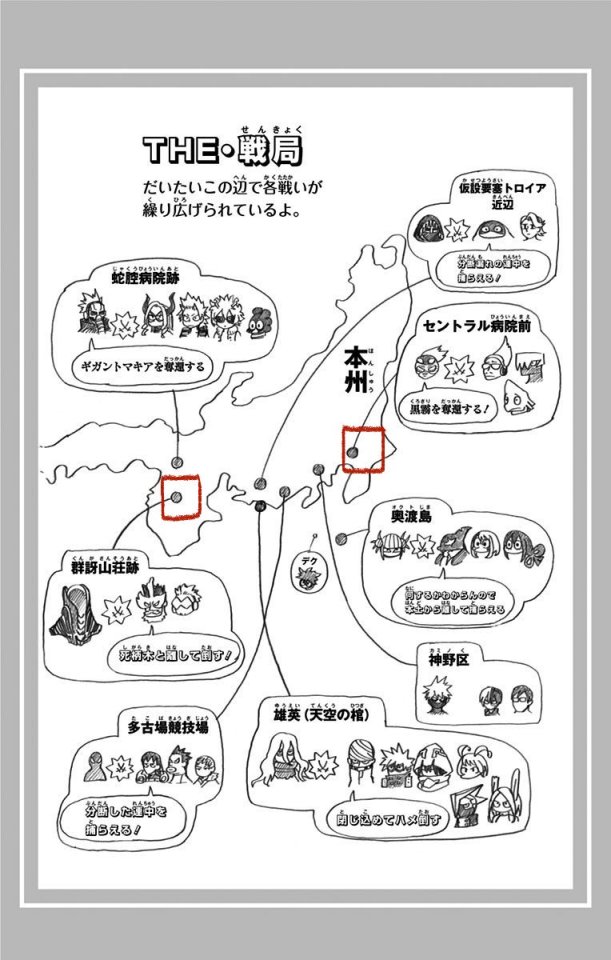
The most probable explanation seems to be that Hawks had considered the possibility that Jin would not cooperate with him and arranged to have people on standby prepared to scrub Jin from the area to prevent a situation like this. At some point before the events of Villain Hunt, Hawks returned to Gunga Mountain Villa with the equivalent of a commercial grade power washer for the express purpose of destroying any remnants of Jin’s body that might have been overlooked by the cleanup crew, in effect erasing him, so it should not have been possible for Himiko to collect a sample of his blood, hence his surprise.
……!荼毘か⁉︎
= ……! Dabi [did this]!?
もう遅い
= “It’s too late.”
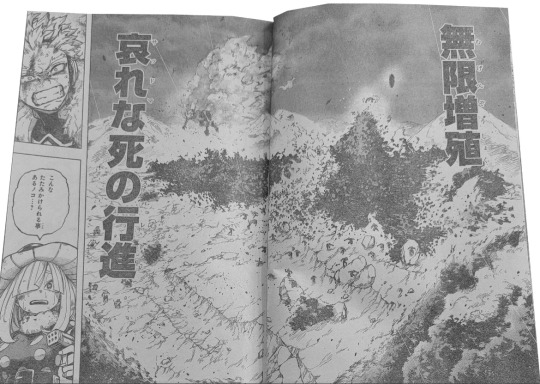
無限増殖
Infinite Doubles
哀れな行進
サッドマンズパレイード
Sad Man’s Parade (read as: Miserable Parade)
こんなたたみかけられる事あるノコ…?
= “Has [anyone] ever piled on like this before, shroom…?” or “Has something like this ever been achieved before, shroom…?”
こんな (romaji: konna) is an adjective meaning “such (about something/someone close to the speaker, including the speaker), or about ideas expressed by the speaker; like this; this kind of.” たたみかけられる (romaji: tatamikakerareru) is the potential form of the verb たたみかける (romaji: tatamikakeru) meaning “to pile on; to press on” or “to press for an answer; to shower questions on someone.” 事ある / 事成る (or ことなる, romaji: kotonaru) is an intransitive verb meaning “to come to pass; to be realized; to be fulfilled; to be achieved.”
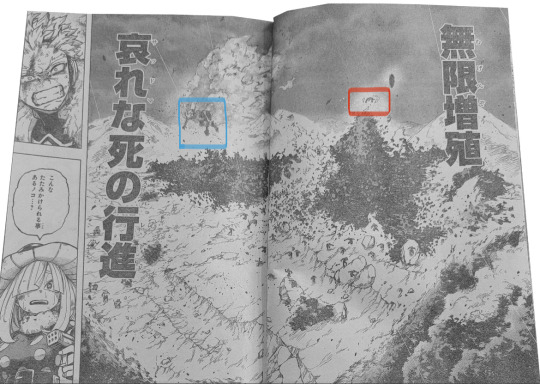
This is the same screenshot. In the red is Himiko falling from Kurogiri’s portal and creating clones of herself, each one Doubling. In the blue is Touya flying over the area, setting fire to the forest and scorching the earth. The furigana read “Sad Man’s Parade,” but the kanji read “Miserable Parade,” so that is the real meaning. This is the event Touya and Himiko planned in No.341. Back then, Touya assured Himiko that at the end of the Miserable Parade the two of them would be laughing. Right now, they are poised to eliminate every remaining Hero and devastate Japan’s population. One thing about Himiko… is she always uses people’s Quirks to their full potential. She may not be the strongest League of Villains member, but she might just be the deadliest. She’s lethal.
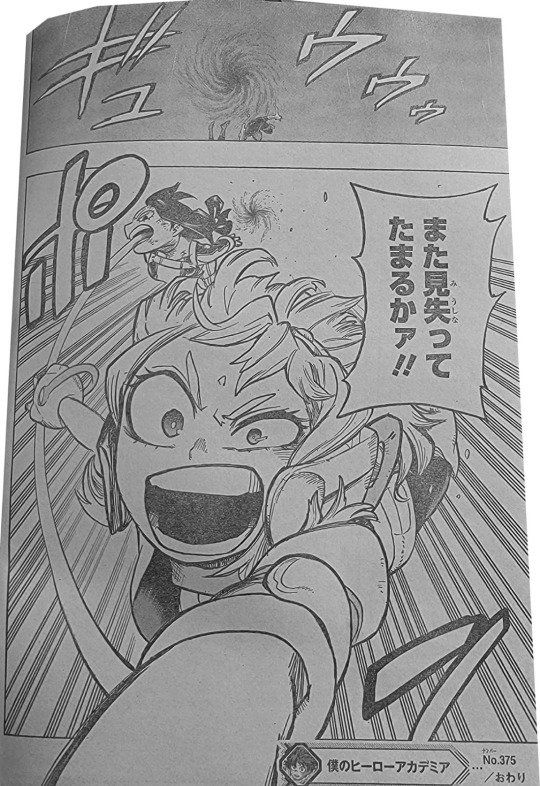
また見失ってたまるかァ‼︎︎
= “I won’t lose sight of you again!!”
たまる (堪る, romaji: tamaru) is a verb meaning “to bear; to endure.” Translated literally, Ochako says, “I can’t bear to lose sight of you again!” Tamaru often adds emphasis (e.g., “I can’t believe that!” versus “I’ll be damned if that’s true!”). Ochako is saying that she definitely won’t allow Himiko to escape.
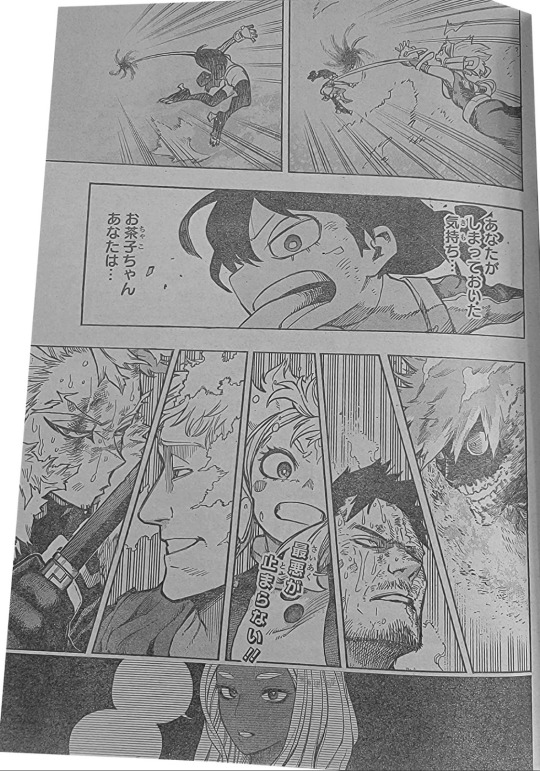
あなたがしまっておいた気持ち…
= The feelings you shut away…
お茶子ちゃんあなたは…
= Ochako-chan, you…
This is a war and people are dying. The last thing anyone should be thinking about is a silly schoolgirl crush, and yet, here we are. Didn’t Tsuyu say something about now not being the time for talks about romance? She’s literally the only person who keeps thinking about it. Ochako isn’t. Himiko’s moved on. Tsuyu’s more invested in Ochako’s love life (or lack thereof) than she is. Tsuyu was “grown” enough to condescend to Himiko, who is older than her, calling her a “child” Izuku-chan "couldn’t have ignored for long" (like Tsuyu ignores her?), but all she can seem to think about is Ochako’s crush being exposed. Seriously, grow up. If Ochako “shut away” her feelings for Izuku, it’s because being a Hero mattered more to her. She’s allowed to prioritize her career over a relationship (Izuku does). That’d be a nice change from the usual shounen love interest. Anyway, Ochako is young. She might feel differently a few years down the road when she’s established and might decide to date and maybe settle down with someone special, or maybe she won’t. Regardless, Ochako isn’t thinking about Izuku or her feelings for him, so it’s kind of weird and frustrating that Tsuyu is so focused on that. Get your own relationship and quit living vicariously through Ochako!
End Tagline:
最悪が止まらない‼︎
The worst won’t stop!!
#bnha#mha#bnha manga#mha manga#bnha manga spoilers#mha manga spoilers#bnha 375 translation#mha 375 translation#himiko toga#touya todoroki#dabi#jin bubaigawara#twice#league of villains#lov
16 notes
·
View notes
Text
actually, for funsies, lemme rattle off as many of otgw’s subtextual death symbols etc. as i can think of off the top of my head
(understanding that the bulk of this is probably well-trod territory if you’ve sought out much discussion on it, and that some of it is inarguably half-baked ideas that i’m interested in bringing up nonetheless)
Beatrice, in the Divine Comedy, is the name of Dante’s lost love. Also, there is a traditional folk belief (having trouble finding its origin) regarding bluebirds as a sign or incarnation of a deceased loved one
“Pottsfield” as a corruption of “potter’s field,” a type of burial place for the unclaimed dead (How nice, then, that all those skeletons seem to get such a joyful welcome!)
(Addendum: I love all those cheeky little lines there, like “Aren’t you a little too…early?” and “Folks don’t tend to leave Pottsfield.” gtfoh)
(DOUBLE ADDENDUM: Reference to this village event as a “harvest” functions at two ends, sort of. Death is commonly compared to a sort of harvest, as with the Grim Reaper; also, the Pottsfield idea of “harvesting” people who are already dead and buried, rather than living people, serves as perhaps the series’s first glimmering hint into the idea that the titular “garden” is a graveyard
The tavern crowd is satisfied to identify Wirt as “the pilgrim;” The Pilgrim’s Progress famously depicts an allegorical journey through death
Endicott—definitely well-trod that his name appears on a headstone in the real world later on, which is more text than subtext. But I wanna mention it anyway bc (while one may conclude that everyone lingering in the Unknown has died) Endicott is the only one it gets so explicit about, and here too is a graveyard-garden synapse crackle: Where can you find him? Well—in the real world, it’s the cemetery, but in the Unknown he’s prospering in his garden
The search for two pennies for ferry fare (presumably, one each for Wirt and Greg, with Fred and Beatrice planning to play dumb and board for free), ending in the sort of left-field thing where Greg sullenly throws them away? cracks me up because I can only imagine the whole episode being written before someone in the room went, “Shit, wait, they can’t actually pay the ferryman— How do we get out of this?”
(Add.: A ferry typically crosses a body of water rather than traveling along it, doesn’t it? Usually, a vessel like the one depicted would be called a “riverboat;” the decision to consistently call it a “ferry” instead is deliberate as hell.)
Beatrice’s initial endeavor is in bringing the boys to “Adelaide of the pasture”—or, in only slightly different terms, putting them “out to pasture”
Some more small ones, but when they encounter the other frogs and realize they’re all clothed, Greg kind of oddly makes a particular point of noting their unclothed frog’s “cold feets;” bare feet are sometimes used in art to suggest death, and separately, going barefoot is a part of proper mourning in some traditions. Also—there’s something to those frogs burying themselves in the mud to sleep, and to our party going on instead of staying with them, isn’t there?
Ask not for whom the bell tolls; it tolls for…thee, ultimately, if you get eaten? I’m gonna be tbh with you, I don’t see a strong connection here, but it feels weird to not mention it when there IS a strong (if general) association of bells as announcers of death. Maybe I’m missing something.
Greg sure does visit (and choose to return from) what can only be described as someplace resembling a child’s heaven. Traditionally, only one way to achieve this.
Oh, man, no big surprise with, like, “Come Wayward Souls”’ moody ass, but “Patient Is the Night” is such a cool instance of a particular old-fashioned, folkish flavor, poetically obfuscating the topic of death to present it as welcoming and restful (couldn’t work out a less pretentious or clunky way to say that).
And last, for now: Hey, shit, I’m pretty sure this doesn’t quite add up to anything, it’s just… It’s kinda weird that Greg’s big crime is revealed as the theft of a stone (painted to represent a person) from somebody’s garden, when this poetic interpretation of a graveyard as a “garden” (lined with stones, each carved to represent a person, in a different way) is established pretty thoroughly. Like, I won’t pretend that’s not kinda a reach. But it’s not nothing nothing, right?
5 notes
·
View notes
Text
4 notes
·
View notes
Text

No man is an island, entire of itself;
every man is a piece of the continent,
a part of the main.
If a clod is washed away by the sea,
Europe is the less,
as well as if a promontory were,
as well as if a manor of thy friend's or of thine own were:
any man's death diminishes me,
because I am involved in mankind,
and therefore never send to know for whom the bells tolls;
it tolls for thee."
In the Catholic (Christian) tradition, all humanity is connected to the Body of Christ, and all are equal before God. This is also true in the Buddhist tradition, however, Buddhists include all of creation, not just humankind.
In the Afterlife, no more males or females, Jew or Greek.
The Bible states that “we are many parts, but we are all part of one body in Christ” and that “there should be no schism in the body; but that the members should have the same care one for another.
And when one member suffers, all the members suffer with it; if one member is honored, all the members rejoice with it. Now ye are the body of Christ and members in particular.”
The implication for the individual living on Earth is that he is part of a greater whole, such that the death bell has deep and significant meaning for everyone who hears it. We are all in this life together and part of the same divine plan, so the bell does toll for all who have ears to hear it.
The toll for another’s death is also a reminder to the individual hearer to get his own affairs in order in the short time remaining before his own death.
The civic-mindedness that comes from seeing oneself as part of a greater whole also provides direction for voluntary charity as an expression of spiritual devotion as one tries to live by divine standards.
Many in "post-modern society" have lost this sense, including many still in the church. Now it is "I" and no longer "we." This tragedy rest on the failure of the religious to not live in hypocrisy and the failure of psychology in only focusing on the development of the ego.
1 note
·
View note
Text
youtube
Act I, Track 06 - Bring Her Home
Song links: Spotify - YT Music - Apple - Tidal
With introductions out of the way, the story can begin to unfold. In this song, Helena is in a church and speaks to the priest, played by the Swedish bass Michael Schmidberger (previously known for the bass parts on the Lemuria album), about her mother Sophia, who, as we know, has recently passed away:
[Helena:] Hear my prayer, thee almighty God For my mother - bring her home Like an angel heaven-bound So that she may find thy side [Priest:] Don't sound so sad my child No sorrow will prevail Sophia knows every word Be sure of this my child I have to leave you now No wish will be left unheard
As he leaves, Helena notices Seth, whom she has never seen before. Seth is having a crisis of faith and speaking to a portrayal of Jesus on the Cross. He does not notice her, but she is fascinated by him.
[Seth:] What of darkness, Nazarene Did it haunt your heart? [Helena:] Who may he be? Hope in doubt and fear Golden atmosphere And a cry so divine [Seth:] I am the real Messiah, born where Christ did fall Soon bringing eyes to the blind Humanity refined, I will unite them all Become the truth for all mankind
These last lines are performed quite passionately. Seth seems immensely frustrated and seems to almost taunt the crucified Jesus. He sees himself as the "real Messiah" who will do better than Jesus by - so says the inlay - uniting humanity instead of dividing them as Jesus did. A heretical sentiment no doubt, and in fact Johanna, who comes in at this moment and hears his words, does not hesitate to point this out, biblically, to Helena, who does not argue back:
[Johanna:] Sister of mine - prophets may be false Beware what you hear and see Tolling bells I find no singing in the chimes [Helena:] Join me sister as I pray: Hear my prayer thee almighty God For our mother - bring her home
If you want, you can watch Chiara, excellently in character as Johanna, stare daggers at Thomas' back during a live performance of Seth's monologue.
We already see the core conflict between Seth's attitude and Christian teachings: A gifted man who wants to save the world is good and well, but Seth puts himself above Jesus.
Beloved Antichrist is loosely based on the book "Short tale about the Antichrist", written in 1900 by the Russian author Vladimir Solovyov, who goes into much more detail concerning the Antichrist-to-be's attitude toward himself and toward Jesus.
#tracks#act 1#johanna orsini#helena orsini#seth thanos#symphonic metal#therion#taaposts#michael schmidberger#vladimir solovyov#opera#metal#musical#musicals
1 note
·
View note
Text
@whalefelled asked:
“It’s okay to cry. It’s always okay to cry. If you need a shoulder, I’d be happy to lend you mine. That should help you feel a little less lonely.” - from Minfillia
ask meme // accepting // i recently talked about moen so yknow wh-
Urianger has been trying to write something. People will need to be notified, and it falls to him. There is parchment before him, and it is blank. It's been blank for a good half a bell or so. Moenbryda is dead, and he doesn't know how to write that.
(A scholar does as such: tally the dead, assign them a name, a number, a box on a ledger. Notate the time and reason. These are facts, and the fact is that Moenbryda is dead. Put this in a category, in a list with many other names, and wait until one day decades from now another scholar reads these names all the same and summarizes it with a simple number in a textbook. A scholar does as such: observes, notates, and does not interfere directly.)
Urianger knows how to write a notice. He's read plenty. He knows to whom this letter must be delivered. He knows this, but he can't figure out how to do it or what's wrong with him that makes it so he can't even put the opening. Rote. Memorized. He is a scholar, and a scholar's job is to document. It should be him who documents this, but he cannot write the words. A parchment discarded has only a massive splotch of ink, putting quill to paper and just letting it sit there, immobile.
Moenbryda is dead and Moenbryda is a number on a list of Ascians' death toll. Urianger doesn't hear Minfilia enters, and startles when she speaks, abruptly jerking himself to stand up straight, fingers tightening in the parchment to accidentally rip it.
It takes him a second to focus on Minfilia, a second further to actually process her words. That's not helpful of him, either. He should be better than that. "I... thank thee for the consideration." He shouldn't need to cry. Should he? This is not the first death he's seen. He doesn't need to cry, because such a thing isn't helping anyone. "Nevertheless, nay, I am... simply thinking." He's pausing too much, unlike him. He very much isn't thinking, either. "I appreciate thy presence, Antecedent, and thy company. Apologies, if I hath been found taking too long with this. I should." He pauses, looks away and clears his throat. "I should be finished ere long, able to occupyeth myself with tasks that might furnish aid with the current emergency." To simply swallow it, because the world is bigger, and writing it down will not make it any more or less real. A scholar is to document, and a scholar is to be of use. He must return to both, lest find himself useless.
0 notes
Text
that's a nice bell, i wonder for whom does it toll?
it tolls for
THEE 🫵
i hate the 🫵 emoji why is the hand so big and threatening
25 notes
·
View notes
Text
MEDITATION XVII
By John Donne
NUNC LENTO SONITU DICUNT, MORIERIS.
Now this bell tolling softly for another, says to me, Thou must die.
PERCHANCE he for whom this bell tolls may be so ill as that he knows not it tolls for him. And perchance I may think myself so much better than I am, as that they who are about me, and see my state, may have caused it to toll for me, and I know not that. The church is catholic, universal, so are all her actions; all that she does, belongs to all. When she baptizes a child, that action concerns me; for that child is thereby connected to that head which is my head too, and ingraffed into that body, whereof I am a member. And when she buries a man, that action concerns me; all mankind is of one author, and is one volume; when one man dies, one chapter is not torn out of the book, but translated into a better language; and every chapter must be so translated; God employs several translators; some pieces are translated by age, some by sickness, some by war, some by justice; but God's hand is in every translation, and his hand shall bind up all our scattered leaves again, for that library where every book shall lie open to one another; as therefore the bell that rings to a sermon, calls not upon the preacher only, but upon the congregation to come; so this bell calls us all: but how much more me, who am brought so near the door by this sickness.
There was a contention as far as a suit (in which, piety and dignity, religion and estimation, were mingled) which of the religious orders should ring to prayers first in the morning; and it was determined, that they should ring first that rose earliest. If we understand aright the dignity of this bell, that tolls for our evening prayer, we would be glad to make it ours, by rising early, in that application, that it might be ours as well as his, whose indeed it is. The bell doth toll for him, that thinks it doth; and though it intermit again, yet from that minute, that that occasion wrought upon him, he is united to God. Who casts not up his eye to the sun when it rises? But who takes off his eye from a comet, when that breaks out? who bends not his ear to any bell, which upon any occasion rings? But who can remove it from that bell, which is passing a piece of himself out of this world?
No man is an island, entire of itself; every man is a piece of the continent, a part of the main; if a clod be washed away by the sea, Europe is the less, as well as if a promontory were, as well as if a manor of thy friend's or of thine own were; any man's death diminishes me, because I am involved in mankind, and therefore never send to know for whom the bell tolls; it tolls for thee.
Neither can we call this a begging of misery, or a borrowing of misery, as though we were not miserable enough of ourselves, but must fetch in more from the next house, in taking upon us the misery of our neighbors. Truly it were an excusable covetousness if we did; for affliction is a treasure, and scarce any man hath enough of it. No man hath affliction enough, that is not matured and ripened by it, and made fit for God by that affliction. If a man carry treasure in bullion or in a wedge of gold, and have none coined into current moneys, his treasure will not defray him as he travels. Tribulation is treasure in the nature of it, but it is not current money in the use of it, except we get nearer and nearer our home, heaven, by it. Another may be sick too, and sick to death, and this affliction may lie in his bowels, as gold in a mine, and be of no use to him; but this bell that tells me of his affliction, digs out, and applies that gold to me: if by this consideration of another's danger, I take mine own into contemplation, and so secure myself, by making my recourse to my God, who is our only security.
#John Donne#Not daily poem but daily prose?#Anyway every line in this is golden and I return to it often#Long post
10 notes
·
View notes